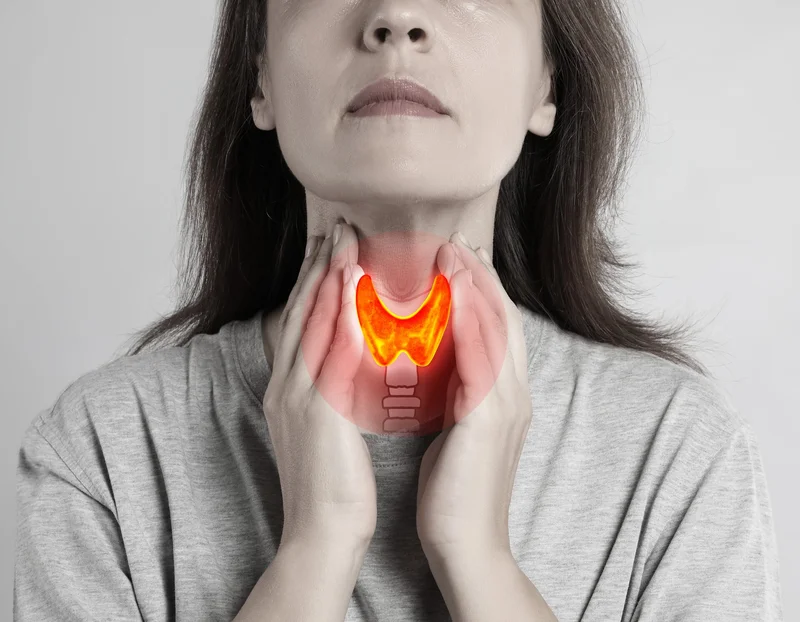Symptoms of Thyroid Problems: What to Look Out For?

Photo source: 123rf.com
Since the thyroid gland controls literally all processes in the body, any disruptions in its functioning affect the appearance.
The butterfly-shaped gland plays a very important role in the functioning of the human body; failures in its work disrupt the activity of many systems and organs. How do you know that the thyroid gland is not in order and it is time to see a doctor? This was told by gynecologist, endocrinologist of the CIDK clinic network, ambassador of the FILLLIN.RU aesthetic medicine clinic booking platform Ekaterina Kozlova.
"The thyroid gland is one of the largest in the human body. It is responsible for the production of hormones, under the "guidance" of which lipid metabolism occurs, normal body temperature is maintained and all systems work. Any deviations in the functioning of the thyroid gland lead to failures in the body," explains the network of clinics CIDK, ambassador of the platform for booking aesthetic medicine clinics FILLLIN.RU.
Thyroid gland - what is it for?
This small organ is located in the lower part of the neck and has the shape of a butterfly. The thyroid gland is part of the endocrine system, which regulates the body's activity with the help of hormones. By releasing them into the blood, the thyroid gland controls the rate of metabolism, the activity of the digestive system, the production of vitamins, the menstrual cycle and even the psychological state. In order to synthesize hormones, the body needs iodine, iron, selenium and molybdenum, which come from food. Therefore, it is so important to eat a varied diet, monitor the level of trace elements and prevent anemia.
What indicates a malfunction of the thyroid gland?
Problems with the "butterfly" gland can arise for various reasons. Among them are: viral infections, lack of iodine in the body, iron deficiency, vegetarianism, disruption of circadian rhythms, the presence of chronic stress, taking certain medications, autoimmune diseases, pregnancy. Both a decrease in hormone production and an increase are equally harmful to the body. If the situation is left to its own devices and not treated, the problem will worsen, leading to the development of obesity and heart problems.
Women's Health
Infertility, menstrual irregularities, problems with libido, a lump in the throat sensation are red flags that pave the way to the endocrinologist's office.
All these signals do not come alone, but are aggravated by additional symptoms that can be written down in the list of erroneous diseases, while the solution can be found in a set of thyroid tests.
Among the most common thyroid diseases, hyperthyroidism, hypothyroidism, goiter and others can be distinguished.
Photo source: 123rf.com
Hyperthyroidism
Excess of T3 and T4 hormones significantly accelerates metabolic processes. As a result, there are interruptions in the work of internal systems. Common symptoms:
- increased heart rate, resting pulse exceeds 100 beats per minute;
- weight loss;
- digestive problems (flatulence, bloating);
- increased fatigue;
- active sweating and feeling of heat;
- sleep problems;
- hand tremors;
- hair loss and dry skin;
- increased body temperature.
Hypothyroidism
With this disease, the function of the gland decreases and the production of hormones is reduced. In the initial stage, there are no bright symptoms, later drowsiness, weight gain, constipation, problems with memory and concentration, muscle weakness, cramps, osteoporosis, menstrual irregularities appear. Lack of hormones leads to a slowdown in metabolic processes in the body, which negatively affects it.
Goiter
Enlargement of the thyroid gland, which is accompanied by active production of its hormones. Often such conditions are caused by a lack of iodine in the body. As a result, swelling is formed in the lower part of the neck in front, which is not accompanied by any unpleasant sensations or, conversely, causes problems with swallowing and breathing. The patient constantly feels a lump in the throat, coughs.
Photo source: 123rf.com
How do thyroid problems affect your appearance?
Since the thyroid gland controls literally all processes in the body, any disruptions in its functioning affect your appearance. For example, if hormones are not produced sufficiently, your skin becomes dry and flaky, your hair becomes brittle and falls out. Swelling often appears on your face. Libido decreases or disappears completely, and intimate dryness appears.
Patients with Graves' disease sweat a lot, their hair becomes thinner and quickly becomes covered in fat.
Changes in thyroid hormone levels are the cause of acne that cannot be treated with standard methods. Such conditions are most often found in hyperthyroidism. After all, patients have an elevated body temperature, increased sweating, which becomes an ideal environment for the development of pathogenic microbes.
In such situations, it is important to consult an endocrinologist, undergo a check-up with the appointment of supplementation, infusion therapy, and try to bring the hormonal background back to normal. It will not be possible to cope with the problem using cosmetics alone. But beauty techniques can help restore the health of the skin, hair and mucous membranes.
In terms of improving hair growth and hydration of the mucous membranes, plasma therapy has proven its effectiveness. You can get rid of dry skin and mucous membranes of the intimate area in several sessions of biorevitalization and mesotherapy. Phototherapy and laser exposure work well for various forms of acne. These procedures help activate regeneration processes in cells and reduce inflammation.
But all this will be effective only after eliminating the source of the problem - improving the functioning of the thyroid gland. Therefore, if any of the above symptoms occur, it is very important to consult a doctor.